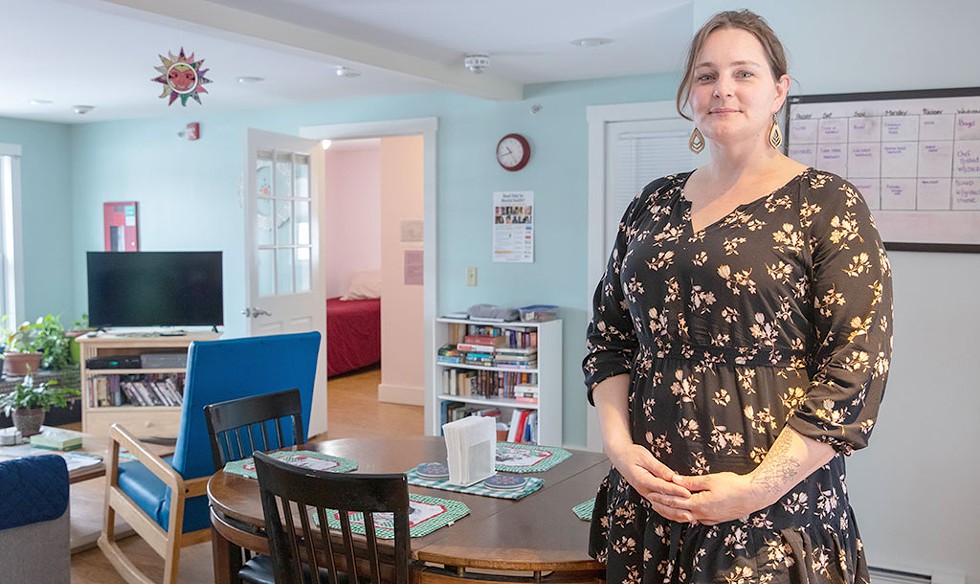
- Steve Legge
- Jenn Heroux-Bachand, crisis bed manager with Northeast Kingdom Human Services
“I have a 'Don't go to sleep until the work is done' kind of attitude,” she explained in a phone interview.
Still, she’s struggling with her current workload.
In addition to managing her two-bed hospital diversion facility in St. Johnsbury, Heroux-Bachand also oversees a separate public inebriation bed, providing a safe place for people who have been taken into police custody while under the influence of drugs or alcohol. She also coordinates care for a client with severe mental illness who is homeless — and, because of staffing shortages, she pitches in to help her staff provide 24-hour coverage for that individual. On top of it all, she’s been one of the few staff available to pick up emergency service shifts at Northeastern Vermont Regional Hospital, assessing the mental health needs of patients who arrive at the emergency department or who need assistance in the community.
During a recent two-week stretch, out of necessity, Heroux-Bachand logged a total of 225 hours.
Not surprisingly, she is constantly multitasking. While describing her job over the phone at 8:30 a.m. — sounding tired but determined — she was also checking her email, taking out the trash and preparing her lunch; next, she had a 9 a.m. Zoom meeting.
In the rare moments when she’s not working, she’s with her four teenage children, who range in age from 13 to 18. “I have a really supportive family, and they understand the work that I do is for a good purpose,” she said. “I think, by doing the work and telling the kiddos about it, it makes them better people. You know, like, ‘Hey, this is what the world's like, and this is what we can do to help.’”
Right now, Heroux-Bachand and dedicated mental health professionals like her around the state need a lot of help.
How Can You Help?
- Apply for a job: If you’re looking for meaningful work that matters, check out these job postings and share them with family and friends.
- Contact your state legislators and ask them to support a Medicaid rate increase so staff are paid at market rate and all receive livable wages.
- Donate to, or volunteer at, your local agency that provides mental health and/or developmental disability and substance use supports and services. Find a list on the Vermont Care Partners website.
- Support your neighbors, friends and family when they are in need.
Dependent on Medicaid rates and the state budget to set wages, these agencies have been chronically underfunded. They’ve been struggling to recruit and retain staff for the last two decades, but things have worsened since March 2020. As the pandemic has precipitated a spike in demand for their services, they have been hemorrhaging employees. In February 2021, there were 790 unfilled positions; by September, there were nearly 1,000, a staggering 20 percent of the workforce. Some agencies have vacancy rates as high as 60 percent.
The exodus is happening all over the state in multiple professions, including direct support professionals, therapists, social workers, case managers, respite workers and addiction counselors. One thing these departing workers have in common: They cite low pay as one of the biggest reasons for leaving, said Simone Rueschemeyer, co-director of Vermont Care Partners, which supports 16 of the agencies.
“We are at a breaking point," warned Rueschemeyer. "This is a moral call to action. The health and safety of our staff, and those we support, is at significant risk.”
‘A different level of mental strain’
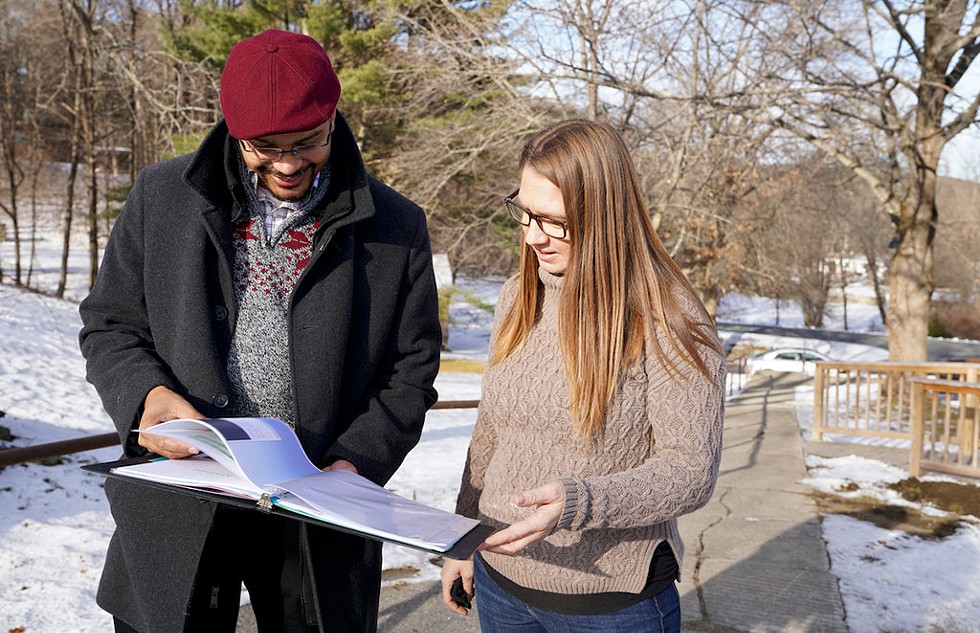
- David Shaw
- Rohan Providence with a coworker
Families First refers to people receiving services as “advocates” to emphasize that they are ultimately in control of their lives. The entire agency serves 88 advocates; Providence is a service coordinator for eight of them. His advocates have a broad spectrum of service needs and many require 24-hour support, but he’s struggling to find people who will take that job for $16 an hour.
“Two years ago, $16 an hour would have been amazing,” he said. “But now, because everyone is raising their minimum wage, you can work at a grocery store and get $16 an hour or make $19 an hour at a fast-food chain.” Dealing with a frustrated customer at a store might last for a few minutes. At Families First, a direct-support professional might spend eight hours working one-on-one with an advocate who is struggling and upset. “And because you’re there, you’re going to be the person that they’re going to take their frustration out on,” he explained. “There's a different level of mental strain that comes with this job.”
Carolyn Gillis, a licensed clinical social worker, has been at the Counseling Service of Addison County for 18 years and is seeing similar personnel problems. “We have lost an incredible number of staff over the last couple of years,” she said.
People like Gillis are drawn to the community health field because they’re passionate about helping people. But they have to be able to earn a living, too. “Some of the people that have left were able to find hospital work or work in other agencies where they're able to make quite a bit more money,” she observed.
Her department just hired a new therapist after searching for someone for two years. Several strong candidates ended up turning down the job because of the pay. “The salary that we're able to offer is so incredibly low for someone with a master’s degree,” she said.
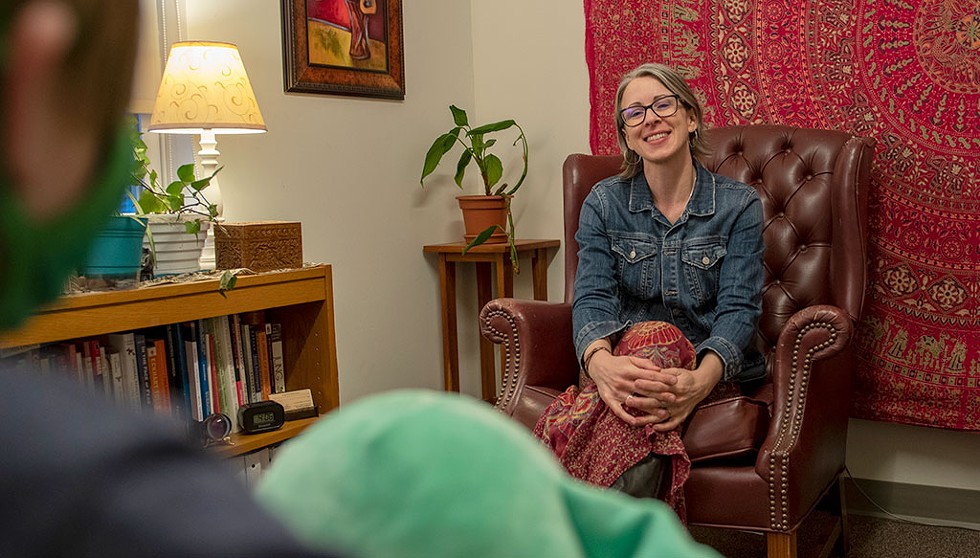
- Caleb Kenna
- Carolyn Gillis, licensed clinical social worker with Counseling Service of Addison County
Her current team consists of three full-time and nine part-time staff. They’re all older than their boss, and many of the part-time staff are living on Social Security disability, which means that they’re each only allowed to work 20 hours a week. But Heroux-Bachand raves about them. “They're the most invested women that I've ever met,” she said. “They're kind, caring, compassionate, have life experience — everything that I need.”
But even they have their limits. The hospital diversion bed typically only accepts clients who take care of their own basic needs, but it recently had to house someone with a serious mental illness who was evicted from a Level 3 care facility and had nowhere else to go. For several days, the staff had to help this individual bathe and use the bathroom, which they weren’t comfortable doing.
“That literally almost burned out my whole entire staff,” Heroux-Bachand said. “They almost all quit.”
She can’t afford for that to happen. Neither can the state.
Bracing for a 'tsunami'
If these agencies were for-profit businesses, they would simply find a way to raise wages. But their leaders and supporters insist it’s not possible to do that sustainably unless the state increases the amount of money it spends on community mental health, intellectual and developmental disability, and substance-use services.Vermont Care Partners, which supports 16 of the agencies, is pressing lawmakers to invest in the state’s community-based system by immediately approving additional funding for short-term hiring and retention bonuses, as well as for overtime compensation for employees who put in extra hours.
In the long term, and most importantly, Vermont Care Partners is pushing for a significant Medicaid rate increase followed by yearly increases to compensate workers at market rates.
That’s the only way to stabilize the system, according to Elizabeth Sightler, Vermont Care Partners co-president and executive director of Champlain Community Services, a developmental disabilities agency in Chittenden County. Sightler noted that the pandemic crystalized the importance of agencies like hers while also laying bare the long-term chronic underfunding and workforce issues.

- Courtesy
- NCSS collaborating with NOTCH to deliver COVID-19 vaccines to clients
Vermont Care Partners co-director Simone Rueschemeyer said lawmakers need to approve a rate increase so agencies can have a minimum wage of at least $20 an hour and higher-paid staff can make as much as they would doing similar work for state government schools and health care facilities. “At this point, about 800 children and adults are waiting to access services, and many others are not receiving the level of care that they need,” she said. "Nearly 90 people with intellectual and developmental disabilities need homes. There is no scenario in which this is acceptable!"
Increasing compensation will help the crisis, said Rueschemeyer. She pointed out that agencies that are paying more despite not having the funds to do so are seeing more résumés and filling more of their open positions. But raising wages without state support puts the agencies at significant risk. “We need the legislature to make an investment. Without it, we’ll remain on the precipice, and some agencies will fall. In fact, we’ve already seen one close,” she said.
How Can You Help?
- Apply for a job: If you’re looking for meaningful work that matters, check out these job postings and share them with family and friends.
- Contact your state legislators and ask them to support a Medicaid rate increase so staff are paid at market rate and all receive livable wages.
- Donate to, or volunteer at, your local agency that provides mental health and/or developmental disability and substance use supports and services. Find a list on the Vermont Care Partners website.
- Support your neighbors, friends and family when they are in need.
These investments won’t only help those most at risk. Having a strong community-based system benefits everyone, said Sightler. Crumbling services due to limited staffing result in crisis situations. People end up having no choice but to turn to costly and inappropriate acute care such as hospital emergency departments, putting lives at risk while straining an already stressed system.
“We don’t have the services downstream to receive the high-needs community folks who will have no place to go,” she said. “This is not an overstatement. This is a very serious situation. If this system fails, the ripples will become a tsunami.”
Sightler warned that agencies like hers have been sounding the alarm for years. “Our remaining workforce stays with us because of dedication to the people we serve, but even the best of the best, those left standing, are more fatigued than I have ever seen them,” she said.
“It is well past time for action.”
In Their Own Words
Three experienced professionals explain what drew them to community mental health — and why they stay.
Carolyn Gillis
Licensed clinical social worker, Counseling Service of Addison County

- Caleb Kenna
- Carolyn Gillis
I went to the Peace Corps for a couple years, and then I went to the University of Vermont and got my master of social work degree. Working as a clinical social worker at a community mental health agency was my absolute dream job because it allowed me to live out the mission of my profession. As part of my internship for my graduate program, I interned at Counseling Service of Addison County down in Middlebury. When I applied for a position here, I told the department director, who was interviewing me, that if CSAC saw fit to hire me, they would have me for life. It's been 18 years, and I'm still here.
We serve a very diverse population. We work with a number of people who are in very difficult financial circumstances, partly because not many private providers are able to accept Medicaid reimbursement rates. But we serve people who are homeless, and millionaires, and everybody in between.
The thing I am really treating, oftentimes, is loneliness. We are social creatures, and we need connection. Without connection, we suffer horribly, and that suffering can manifest itself in depression, anxiety, addiction.
In rural Vermont, a lot of people don't have transportation, or they've got really intense social anxiety. It is devastating how many people are alone. There's one gentleman that I do home visits with. When the pandemic lifted enough so that I was able to do a home visit with him again, I was the first person he'd seen in three weeks. Oftentimes, I'm the only person that he sees in the course of a week.
I went into his home last week, and he was lying on the floor. He said, “Hey, Carolyn, come on in,” and he didn't have the energy to get up onto his chair. And it wasn't just a physical lack of energy. He was just so depleted and discouraged and alone.
So I think about, you know, How can we provide services to people in a way that helps them build capacity to be able to sustain their own needs? But then I also think, How can we as community mental health workers sustain ourselves in this work? I'm scared that I'm going to lose more of my coworkers, because the morale that I get from my coworkers and the culture here is what keeps me going and what helps me remain loyal to this work, despite the relatively low pay and the high demands.
I remember, in graduate school, learning about that concept of unconditional positive regard. And I thought, Oh, that sounds really nice. It sounds like a nice theoretical thing. But then I got to CSAC, and I saw it really put into practice in how everybody treated everybody here — how staff treat each other, how staff treat clients — and it really made me fall in love with community mental health.
Rohan Providence
Case manager, Families First in Brattleboro
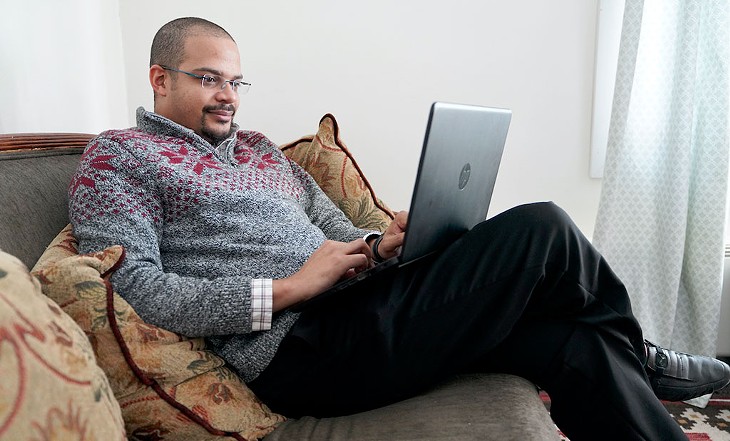
- David Shaw
- Rohan Providence
A lot of it in the beginning was really understanding who the person I was working with was — what their ins and outs were, what made them tick, what made them happy — in order to avoid unsafe environments and unsafe headspaces, which can look very different from person to person.
Before working for Families First, and during the majority of my career here, I also catered. Before that, I was a waiter or working in a kitchen. I've always wanted to not just help people but make people feel better. If you're waiting a table, you want to make sure that people who are eating are having a good time. Part of that is definitely for tips, but if they're happy, then either they'll come back or they'll tell their friends to come back. Working in this field, especially, there are families and advocates who haven't had that kind of treatment from a lot of people. They just want to feel appreciated and feel respected. Just showing that kind of emotion toward them — it fills me with joy. As tough as this job is. I can go home every day knowing that I am, in fact, helping people.
I've had almost every single job there is to have at Families First at this point, and I've worked mostly in 24-hour programs. I’ve had everything happen to me, but a big part of this is realizing that, as much as people are taking things out on you, they're not doing it to personally attack you.
They are targeting me because they know that I’m the person who is working with them today, and they need to take their frustrations out on the world. A lot of these guys and gals have been dealt a really rough hand. Many of the people we support have trauma histories and don’t know how to regulate themselves, and they don’t know how to communicate. They need someone to process their frustrations with.
I’m a Black man who grew up in a white community, in Burlington and Brattleboro. So maybe that's a part of the reason why I'm doing what I'm doing now — because I understand from a very real place that people with disabilities are being ostracized for the way they look or the way they talk, and it's not fair. If I can help people understand, if I can open people's eyes, if I can make the community a safe and happy place to be, that’s what I want. I guess that's my driving factor.
Jenn Heroux-Bachand
Crisis bed manager, Northeast Kingdom Human Services
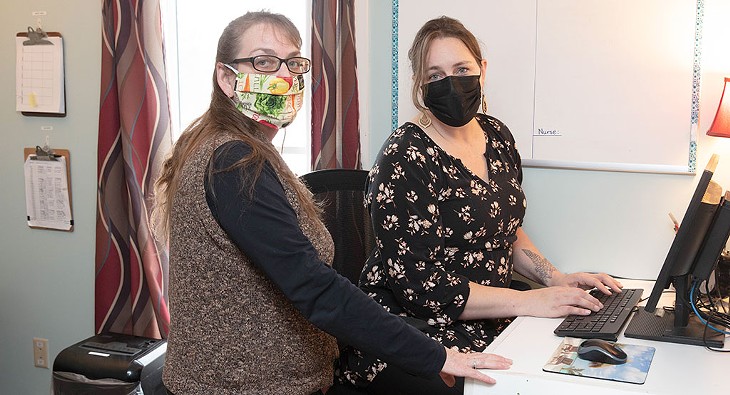
- Steve Legge
- Jenn Heroux-Bachand (right) and colleague Laurie-Anne Couture
I can tell you that every single client that I've had who’s come in and is appropriate for our facility is always sharing, “Oh, my gosh, this is such a wonderful resource,” or “Oh, my gosh, you've done so much for me. Thank you so much.’
We just had a client recently who was homeless, was involved in a significant domestic assault situation, and didn't have a provider for medication management or a therapist. So we got this individual a therapist and a med provider. We helped fix the housing issue. We supported this person in reestablishing a relationship with their daughter. When this person was discharged recently, they said, “Thank you so much. I'm gonna call you in a month and tell you how I'm doing.” I have had another client that was really, really struggling medically. He called me for my birthday and said, “Jenn, I just wanted to say happy birthday to you.” And he had memory issues. So remembering my birthday was just, Wow, he's making progress.
I'm very proud of the culture at my crisis bed facility. It's such a supporting, loving environment, and you never get that at work, right? You always have, like, work conflicts. But we're like a second family. And I feel really good about that. That keeps me going.
